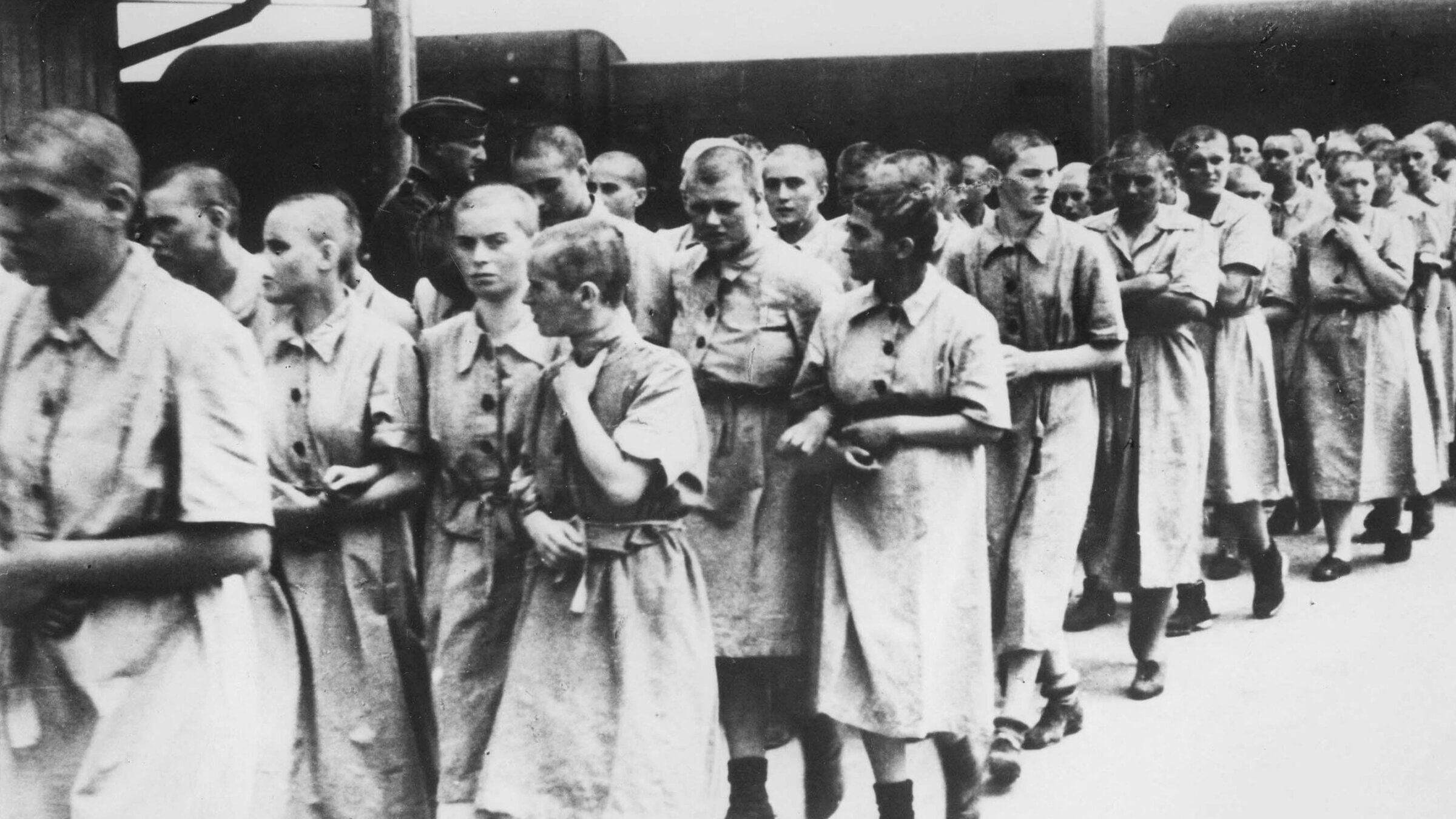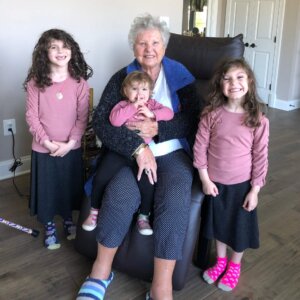Did Nazis make these Jewish women infertile?
New academic research suggests female Auschwitz prisoners may have been given hormones in their soup

Women at Auschwitz, May 1944. Photo by Yad Vashem Archives/AFP via Getty Images
In a TikTok that went viral this summer, a young woman asks her 93-year-old grandmother whether she got her menstrual period during the time she was in Auschwitz. “No,” says the grandmother, the telltale tattooed number visible on her arm, “because they put some kind of drug in the food we ate that made the period go away.”
The video by Miriam Ezagui, a registered nurse, has garnered more than 3 million likes and thousands of incredulous comments. “I would have thought it was due to malnourishment,” wrote one user, jenwimpfheimer. “There is no evidence of such a thing,” said another user. “Hunger deprived menstruation.” A third said the Museum of Auschwitz had denied these claims. “She is lying,” claimed a fourth.
@miriamezagui From drugs and/or starvation women in the concentration camps didn’t get their periods. #holocaust #holocaustsurvivor #neverforget #jewishtiktok #orthodoxjewishlife #bubbyoftiktok #bubby #grandmasoftiktok #menstruation #holocaustvictims ♬ original sound - Miriam Ezagui
Peggy J. Kleinplatz, a professor of medicine at the University of Ottawa, stumbled upon the video while finishing up years of research into the fertility problems faced by Holocaust survivors. The research, with Paul Weindling, a professor of the history of medicine at Oxford Brookes University, was published in the September issue of the academic journal Social Science & Medicine. Ezagui’s grandmother, Lilly Malnik, told a story that echoed those of many of the survivors Kleinplatz had interviewed: that the Nazis had put some chemical into their rations that caused amenorrhea, the scientific term for loss of periods.
Many female survivors had told Kleinplatz the rations smelled and tasted repulsive. In 93 interviews with survivors or their children, Kleinplatz found that 20 were unable to have children after the war, and others reported multiple miscarriages and stillbirths or babies born prematurely; overall, they had a live birth rate of 1.46, compared to 2.6 to 2.9 among American Jews in the 1950s.
“The Nuremberg trial records showed that Nazis wanted to sterilize as many ‘Jewesses’ as possible without their knowledge,” Kleinplatz said in her article. “Something was happening to Jewish women during the Holocaust that was distinctive,” she added, “and nobody’s ever studied its long-term impact.”

The conventional understanding has long been that women stopped menstruating while at concentration camps due to trauma or malnutrition. Kleinplatz began to question this because literature about other atrocities described female victims suffering from amenorrhea after 12 to 18 months, while the Holocaust survivors she interviewed said it happened within 48 hours of arrival at the camps. Her paper cites a 2007 academic study of 580 Hungarian female survivors that said more than 80% experienced “cessation of menses immediately after internment.”
Marion Kaplan, a historian at New York University who studies the Holocaust, cautioned that Keinplatz’s sample size is small, but said the research is “still worth a serious discussion and wider dissemination.”
“This is the beginning of important, neglected research,” Kaplan said.
Kleinplatz, a clinical psychologist who has written several books on sex, sexuality and sex therapy, began looking into the Holocaust’s impact on women’s fertility more than five years ago. She wrote brief articles in Senior Times, Lilith and other publications, asking to speak to female survivors about menstruation. More than 100 responded, most of them nonagenarians.
“It never occurred to me that I was going to get phone calls from survivors not only at the six major death camps, but also the slave labor camps,” she said. “This was much more widespread than I could ever have imagined.”

Malnik told Kleinplatz that she was about 15 years old and worked in the kitchen at Auschwitz, where she was instructed to mix “very light pink chemicals” with the texture of wet kosher salt into rutabaga “soup” as armed guards looked on. The soup-and-chemical mixture was served only to female prisoners so “they don’t get their periods,” Malnik said in the Kleinplatz paper.
Others also told Kleinplatz they’d been served “foul-smelling” soup and believed an additive in their food had caused them to stop menstruating. One in 10 of those she interviewed said they were given injections or pills that they believe caused fertility problems.
Kleinplatz’s hypothesis is that the additive contained synthetic sex hormones, including synthetic estrogen and progestin, because she has found evidence that the Nazis were continuously producing large quantities of these hormones between 1943 and 1945.
The hormones were supposedly being used to treat German women’s infertility, Kleinplatz’s research shows, but synthetic estrogen and progesterone can also be used to prevent pregnancy. And Kleinplatz said the amount of sex hormones produced seems much greater than would have been needed for infertility treatments.
Kleinplatz said she thinks this has not come to light earlier because many researchers were wary of delving too deeply into intimate topics like menstruation. One such researcher, Zelda Abramson, a sociologist and author who has interviewed more than 60 survivors, said in an interview, “I’m guilty as she charges for sure.”
“I didn’t think to ask, ‘Why do you think you can’t have kids?’” Abramson said of her book about those survivors’ post-Holocaust lives, “The Montreal Shtetl.” “You’re sort of wary about how deep into intimate relations you can go into.” Of Kleinplatz’s work, she added: “It’s pretty horrific — I can’t think of any other word — if all women in camps were targeted in that way.”
Of 93 women included in Kleinplatz’s study, all but three struggled to have children; two of the three said they had detected chemicals in their rations and avoided consuming them because of it, and the third was not in a concentration camp.
One Auschwitz survivor, who is now 96, said she and her sister had both sought medical attention after the war, but were still only able to have one child each. “We wanted more,” she told Kleinplatz, according to the academic paper. “We tried. Why didn’t anybody ask me about this before? I wish they had,” she said.
Kleinplatz said that many of the survivors she interviewed told her that dreaming of having big families had helped them endure the camps.
“Most of these women came from large, religiously-observant Jewish homes in Eastern Europe,” she said in the interview. “And for them not to be able to have the kinds of families they wanted meant that they were grieving not only for the past that they had lost, but the future that they had dreamt of recreating.”
Correction: This article was updated Sept. 12, 2022, to reflect that clinical psychologist Peggy J. Kleinplatz is a professor of medicine, not a professor of psychology, at the University of Ottawa.





















